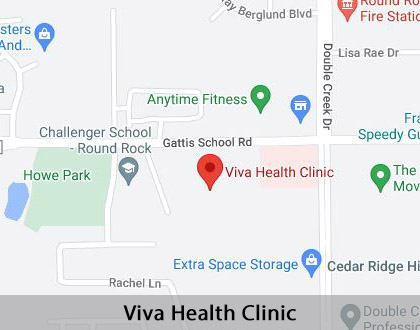Chronic Disease Management Round Rock, TX
Chronic disease management can help many patients return to their regular, day-to-day lives. It is a comprehensive process that includes check-ups, screenings, patient education, and monitoring and coordinating treatment. If your health is interfering with your everyday activities, chronic disease management may be right for you.
Chronic disease management is available at Viva Health Clinic in Round Rock and the surrounding area. Get back to the life you had before your illness. Call us today at (512) 243-5872 to schedule an appointment or learn more about our services.
Understanding Chronic Disease
As defined by the Centers for Disease Control and Prevention (CDC), chronic disease is a condition that lasts a year or longer while also impeding day-to-day activities. They may be described as controlled or stable if they remain unchanged over time. However, chronic disease can go through cycles of growing, shrinking, or staying stagnant.
Some common chronic diseases include, but are not limited to, cancer, diabetes, and heart disease. These are typically caused by a shortlist of risk behaviors: excessive alcohol use, exposure to secondhand smoke, lack of physical activity, poor nutrition, and tobacco use. Though many chronic diseases are incurable, they may still be treatable. In other words, patients can still live with the disease and manage their symptoms.
“Some common chronic diseases include, but are not limited to, cancer, diabetes, and heart disease.”
Preventing Chronic Disease
By eliminating risk behaviors, patients can reduce their risk of contracting a chronic disease and improve their overall quality of life. The most crucial thing a patient can do to prevent chronic disease is to quit smoking, or better yet, never start. Abstaining from tobacco use can lower the risk of cancer, heart disease, lung disease, and type 2 diabetes, even for longtime smokers.
Eating a balanced diet of fruits, lean meats, low-fat dairy products, veggies, and whole grains can also benefit one's overall health. Furthermore, those who are overweight can prevent or delay type 2 diabetes merely by losing 5% to 7% of their body weight. Patients should also aim for a minimum of 150 minutes of moderate physical activity per week. In addition, those who drink alcohol should only drink in moderation. Finally, it is crucial to get enough sleep and get screened regularly.
“By eliminating risk behaviors, patients can reduce their risk of contracting a chronic disease and improve their overall quality of life.”
Chronic Disease Management
According to Healthcare.gov, chronic disease management is an integrated care approach to illness management consisting of check-ups, screenings, monitoring and coordinating treatment, and patient education. By properly managing chronic disease, patients can prevent or minimize its effects, reducing overall healthcare costs.
Chronic disease is not only taxing on individuals but also on the healthcare system. Around 80% of older Americans have at least one chronic disease, and 68% have at least two. These patients must often manage daily symptoms that impede their quality of life. Our team understands how to help patients navigate these frustrations and more.
“Around 80% of older Americans have at least one chronic disease, and 68% have at least two.”
Check out what others are saying about our primary care practitioner services on Yelp: Chronic Disease Management in Round Rock, TX
Chronic Disease Self Management
An essential part of chronic disease management is patient empowerment. By better understanding how to manage one's condition, one can remain prepared and on guard against chronic disease instead of letting it take control over their life. First and foremost, patients need to have a basic understanding of their condition, as this will allow them to better understand what is happening to them and why. This way, they do not have to be entirely dependent on their practitioner.
Instead, the patient can rely on themselves along with their healthcare team and potentially even invite their family and friends to make healthy lifestyle changes with them in order to promote overall health. Patients should also ask their practitioner about the medications they take: why they are necessary, how to take them, what to look out for, potential side effects, and more. Additionally, it is crucial for patients with chronic disease to stay connected with others who can relate, as this can help stave off feelings of depression and isolation.
“Patients should also ask their practitioner about the medications they take: why they are necessary, how to take them, what to look out for, potential side effects, and more.”
Questions Answered on This Page
Q. How can I prevent chronic disease?
Q. How can I manage chronic disease?
Q. How can I manage my chronic disease myself?
People Also Ask
Q. How can people manage hepatitis?
Frequently Asked Questions
Q. Why can it be so difficult to cope with chronic disease?
A. Acute illnesses, such as the flu or the common cold, eventually subside over time. Chronic disease, on the other hand, never goes away. As such, it can negatively impact you and those around you in various ways.
Q. What are some symptoms of chronic disease?
A. The answer depends on the specific type of chronic disease you have. However, common invisible signs of chronic disease include pain, fatigue, and mood disorders. These symptoms may make up a significant part of your day-to-day life.
Q. Can psychotherapy help with chronic disease?
A. Many people find that individual counseling helps them address any emotional issues brought on by chronic disease. Chronic disease often significantly impacts one's sense of identity. We can help patients find the treatment plan they need to work through similar feelings due to chronic pain.
Q. When should I seek help to cope with chronic disease?
A. You should always trust your intuition when it comes to seeking medical attention. However, some surefire signs that you may need professional help dealing with chronic disease include signs of depression (such as loss of interest in things once enjoyed, disturbed sleep, difficulty in relationships, and cognitive issues). You should also seek professional help if you are dealing with multiple sources of stress, such as disability, uncertainty about the future, and financial difficulties.
Q. Which chronic diseases can cause depression?
A. Technically, any illness can trigger feelings of depression. However, according to WebMD, depression is more probable with severe chronic diseases that cause significant life disruption. This risk is also much higher for someone with a history of depression.
Q. What steps can I take to feel better about life with chronic disease?
A. Be proactive. Seek help as soon as you feel like it is necessary. Early intervention is critical to nip problems in the bud before they have the chance to get worse.
Start Feeling Better – Visit Us Today
By visiting us as soon as possible, our team can help get you the professional treatment you need. Instead of waiting around and allowing the symptoms to get worse, we can provide you with treatment options.
Definition of Medical Terminology
Call Us Today
Do not hesitate to regain control of your life and better manage your condition. Our team at Viva Health Clinic can help. Call us today at 512-243-5872 to schedule an appointment or learn more about our services.
Helpful Related Links
- American Diabetes Association. American Diabetes Association. 2023
- American Heart Association. American Heart Association. 2023
- American Journal of Medicine. American Journal of Medicine. 2023
- American Lung Association (ALA). American Lung Association (ALA). 2023
- American Medical Association (AMA). American Medical Association (AMA). 2023
- American Society of Clinical Oncology. American Society of Clinical Oncology. 2023
About our business and website security
- Viva Health Clinic was established in 2023.
- We accept the following payment methods: American Express, Cash, Discover, MasterCard, and Visa
- We serve patients from the following counties: Williamson, Travis, McLennan
- We serve patients from the following cities: Pflugerville, Austin, Kyle, Waco, Leander, Cedar Park, Bastrop, Round Rock, Georgetown, Hutto, Liberty Hill, and Taylor
- National Provider Identifier Database (1104428416). View NPI Registry Information
- Norton Safe Web. View Details
- Trend Micro Site Safety Center. View Details
Back to top of Chronic Disease Management










